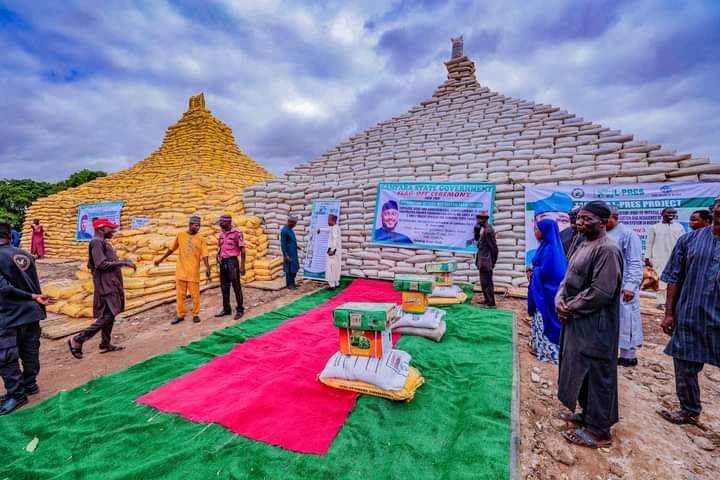Zamfara State Governor, Dauda Lawal, on Wednesday, July 9, 2025, flagged off the distribution of farm inputs for the 2025 wet season and officially commissioned the new Fadama House at the Ministry of Agriculture in Gusau.
Governor Lawal reaffirmed his administration’s commitment to revitalizing agriculture, describing the sector as the lifeblood of Zamfara’s economy.
According to a statement by the governor’s spokesperson, Sulaiman Bala Idris, the launch included the deployment of 98 trucks of fertilizer for distribution to farmers across the state.
In addition to fertilizers, the distributed farm inputs comprised 34,800 kg of rice seeds, 80,000 kg of maize seeds, 23,740 liters of herbicides, 11,735 liters of insecticides, and 23,470 sachets of seed dressing chemicals.
In his address at the flag-off, Governor Lawal emphasized that providing free fertilizers and agricultural support demonstrates his administration’s commitment to sustainable rural development.
“Agriculture remains the lifeblood of our state’s economy. It is not just a sector—it is the very identity of our people,” he said.
“Our administration has embraced the slogan ‘Farming is Our Pride.’ It speaks to the core of who we are and what we must prioritize. Over 85% of our population depends on agriculture for survival. It is our moral obligation to support and empower them.”
Governor Lawal stated that the state’s Agricultural Transformation Plan is designed to drive food security, create jobs, reduce poverty, and foster inclusive economic growth.
He explained that the plan aligns with Sustainable Development Goal 2, which aims to end hunger, improve nutrition, and promote sustainable agriculture.
Despite the challenges posed by climate change and a delayed rainy season, Lawal assured that the government remains proactive in providing farmers with the tools and resources needed to boost productivity.
“We invest in seeds, fertilizers, systems, technology, and human capital to achieve long-term impact,” he said.
“Our inclusive vision recognizes women, youth, and people with special needs as agents of transformation. We’ve also digitized our distribution process to prevent diversion and ensure transparency.”
He acknowledged ongoing challenges faced by farmers, including limited access to inputs, financing, market instability, post-harvest losses, and climate-related risks.
In response, the administration is pursuing integrated, scalable interventions to build a comprehensive value chain from planting to post-harvest.
“We are promoting mechanization, strengthening extension services, and improving access to agro-processing and markets,” Lawal added.
Addressing the beneficiaries, the governor urged them to use the distributed inputs responsibly.
“These inputs are not for sale. They are not commodities for short-term gain. They are investments in your future and the future of Zamfara. Use them wisely and productively,” he said.
Governor Lawal concluded by formally flagging off the 2025 Wet Season Farm Inputs Distribution, set to benefit 59,205 smallholder farmers across the state.


